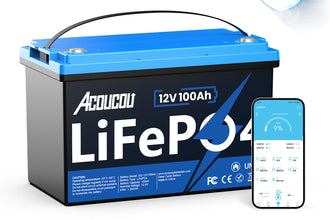

In the quest for sustainable energy solutions, the spotlight has turned to LiFePO4 batteries as a promising option for eco-friendly energy storage. As the world transitions towards renewable energy sources, the need for efficient and reliable energy storage systems has never been more critical. Compared to other batteries, LiFePO4 batteries offer a range of benefits that make them an attractive choice for powering the future of clean energy.
Non-Toxic and Non-Hazardous
Unlike lead or other heavy metals, lithium does not bioaccumulate and is not dangerous. However, the majority of lithium battery chemistries employ manganese, cobalt, or nickel oxide in their electrodes. No rare earths or toxic metals are utilized; instead, commonly available materials such as copper, iron, and graphite are employed. These materials are estimated to need 50% more energy to create than the electrodes in lithium iron phosphate batteries. These elements can cause environmental harm during mining, manufacturing, and disposal.
Ease of Recycling
Over 3 million tons of lead-acid batteries are discarded annually. Although some of them can be safely recycled to recover lead and other materials, many end up in landfills, especially in developing countries where toxins can cause fires and explosions, and contaminate food and water supplies for generations.
Because the electrodes are made of non-toxic materials, LiFePO4 batteries pose less environmental harm than lead-acid batteries. They can also be recycled. Recycled materials used in electrodes, wiring, and enclosures can be used for new lithium batteries.
Lower Risk of Thermal Runaway
LiFePO4 batteries have a lower risk of thermal runaway, which is a dangerous condition where the battery temperature increases uncontrollably, leading to fire or explosion. The stable chemistry of LiFePO4 reduces the risk of thermal runaway, making them safer for both users and the environment.

Longer Lifespan
LiFePO4 batteries have a longer lifespan compared to other lithium-ion batteries, lasting up to 2000 cycles or more. This means fewer batteries are needed over time, reducing waste and environmental impact.

Higher Efficiency
LiFePO4 batteries typically have a higher charge and discharge efficiency. This means that more of the energy put into the battery during charging is retained and can be efficiently used during discharge. Higher efficiency results in less energy waste and, consequently, a lower environmental impact.
Lithium iron phosphate batteries are generally considered to be free of heavy metals and rare metals, non-toxic, pollution-free, and compliant with European RoHS, making them an absolutely green and environmentally friendly battery. Although lithium iron phosphate batteries are more environmentally friendly, they cannot avoid the problem of heavy metal pollution. If discarded arbitrarily, it will be also harmful to the land. When the lithium iron phosphate battery is used up, it is best to recycle it in time.










